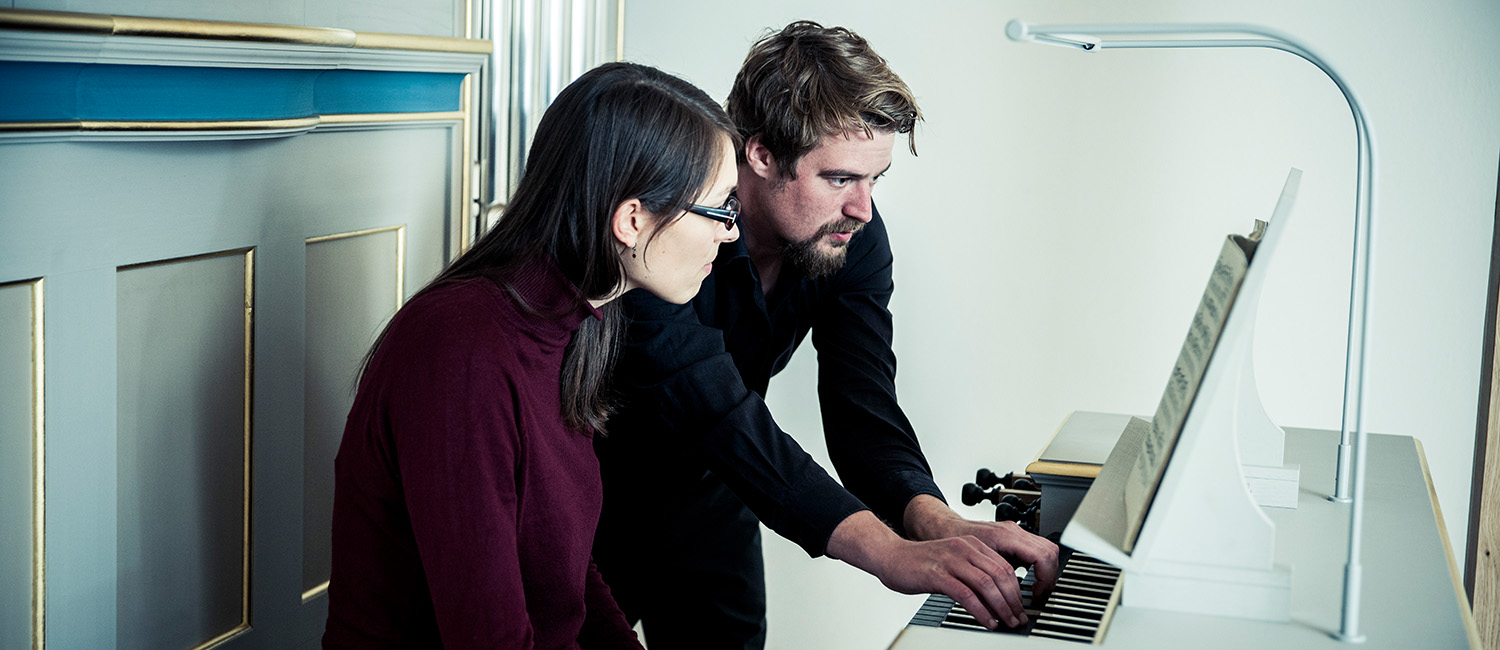Aims and course content of the programme in church music
Studying the organ on the most famous instruments in the world
Studying Church Music and Organ in Weimar means diving into the soundscape of renowned organists and composers like Bach, Mendelssohn, Liszt and Reger. With the unique selection of organs available in central Germany, you can experience and develop interpretations on the world’s most important historical instruments.
Regular classes and concerts take you to the outstanding organs in Arnstadt, Merseburg, Naumburg and Waltershausen, for example. Additional instruments available for teaching and practice purposes can be found in Erfurt (cathedral, Cruciskirche, Predigerkirche), Denstedt and Taubach. Annual excursions to other organ collections across Europe supplement your studies.
Masterclasses, concerts and symposia with international guests broaden this comprehensive education. Prepare yourself for international competitions with extensive background knowledge, investigate your own research questions or participate in the varied range of didactic teaching opportunities.
Improvisation in church services and concerts
Studying Church Music and Organ in Weimar means making your own artistic ideas a reality in a variety of ways. The comprehensive, individual improvisation training in Weimar takes you from the basics of liturgical organ-playing through to improvisation in concerts and international competitions. New music and jazz are also consciously integrated into this. Collaborations with the Catholic parish of Herz-Jesu and the Protestant Herderkirche offer numerous opportunities for church services, concerts and experimentation.
Experimental Organ Studio
Studying Church Music and Organ in Weimar means playing an active role in shaping the future. In the experimental studio, the major works of the 20th/21st century are not simply played and discussed: the students’ own ideas are also developed and tried out on, or in, the instrument. Philosophical and aesthetic discourses open up new perspectives on the organ as an instrument, as well as on organ and church music.
International collaborations with renowned composers, performers and improvisers of a wide array of genres, plus organ-builders, are a core component of this teaching programme, which is unique in Germany.
Instruments
The University of Music Weimar has a total of six organs, which offer the best conditions for studying, teaching, and concert performances. Additional historic pedal instruments such as pedal pianos or pedal cembalos add to the pool of instruments available. For further information please visit the page "instruments".
The course of study is structured as follows:
Instrumentalfächer
- Orgel-Literaturspiel
- Orgelimprovisation und Gemeindebegleitung
- Klavier/Cembalo
Kantoraler Bereich
- Chordirigieren
- Orchesterdirigieren
- musikalische Arbeit mit Kindern
- Gesang, Stimmbildung
- Sprechen
- Liturgisches Singen (ev.)
- Deutscher Liturgiegesang (kath.)
- Gemeindesingarbeit (ev.)
Musiktheorie und allgemeine Musikpraxis
- Musiktheorie/Tonsatz
- Gehörbildung
- Musikanalyse
- Alte Musik, Generalbass-Spiel und Aufführungspraxis
- Partiturspiel
Wissenschaftliche Fächer
- Musikgeschichte
- Theologische Informationen (ev.)
- Liturgik/Glaubenslehre (kath.)
- Liturgik/Hymnologie (ev.)
- Gregorianik (kath.)
- Instrumentenkunde/Akustik
- Orgelkunde
